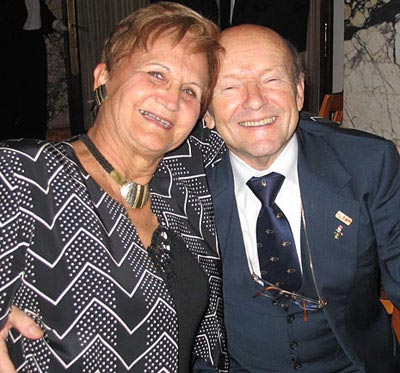Cesare Beccalli’s legacy: making WMA safe for elitism
Since its founding in 1977, the governing body of world masters track — first WAVA and now WMA — has had only four presidents — and Italy’s Cesare Beccalli was two of them. His 1987-1997 stint followed that of founding president Don Farquharson of Canada. Cesare’s latest term — 2005 until his death yesterday — followed that of Sweden’s Torsten Carlius. (Here’s a shot of Torsten and Cesare.) A short, energetic man who would have been 74 in April, Cesare spoke five languages (Italian, French, Spanish, English and a little Portuguese) and once was a cyclist and track athlete (a sprinter who competed in the first world masters meets). I saw him dance like a teenager at 1999 Gateshead worlds athletes party.
Although he was founder (in 1976) of the Italian Masters Association and (in 1978) of the Eurovets organization and organizer of two European Masters Athletic Championships (Viareggio 1978 and Verona 1988) and one WAVA world championship (Rome 1985), his legacy may be helping turn World Masters Athletics into a fiefdom of elite snobs, where power (such as it is) means a seat at the annual IAAF Gala in Monaco and suites at the nicest hotels at worlds.
He reveled in the perks of power.
After the 2001 world masters meet in Brisbane, Al Sheahen of National Masters News ripped the world body’s leadership with a column titled “Which way, WMA?”
Among many other things, Al wrote:
The final hint that arrogance has crept into the WAVA hierarchy is that, throughout the Brisbane Championships, the letters V.I.P. (Very Important Persons) were everywhere.
There were VIP receptions, a private VIP section at the International Party, and special VIP functions during the week at which athletes were clearly not welcome. At least one WAVA Council member was rightfully embarrassed by the ostentatious display. The whole thing smacked of elitism, royalty vs. the rabble, and an “us vs. them” mentality, exactly the opposite of what WAVA is supposed to be about.
This was all fine and dandy with Cesare, who modeled his management after fellow Italian Primo Nebiolo of the IAAF.
Cesare has his own dark history in WMA, having nearly been impeached after he was accused of bribing members of a General Assembly delegation before a presidential vote. The bribes may have been merely paying registration fees of an expanded Hungarian delegation, but they were still deemed truly unkosher.
(He rebutted these claims in my 2005 interview with him.)
Like the late Torsten Carlius, Cesare also was a member of the board of governors of a competing organization — the International Masters Games Association, which puts on the multisport World Masters Games. It’s likely a profitable gig and also against World Masters Athletics rules, as I’ve noted before.
Cesare had the pleasure of reigning over the recent Riccione world masters championships, but he was denied the triumph of engineering Porto Alegre, Brazil (where he died yesterday), as the site of the 2011 worlds. He couldn’t pull that one off, despite every effort to make his winter home the venue. (Sacramento won instead.)
Cesare has two grown daughters from a first marriage. His second marriage was to Lidia Olivera, former president of the Brazilian Masters and organizer of the 1998 Masters South American Championships in Porto Alegre.
Perhaps the last photo of him in public was taken at November’s IAAF Gala in Monaco. Phil Raschker, who accepted the IAAF Masters Athlete of the Year honor, sent me a series of shots that included Cesare. See them here.
Although I question his masters machinations, there’s no doubt he loved his wife (seen with him below). For her loss, I’m very sorry.

|





5 Responses
I am sorry. But in my contact with WMA officers I have not encountered a single man in that smirking WMA hierarchy who I could even remotely respect as a role model. Under the presidency of Cesare Beccalli the WMA has however produced memorable and well-run championships that we grassroots masters athletes have enjoyed very much. We should therefore regret the passing of our WMA President and commiserate with his family. At the same time we should look forward to a new, honest, generation of masters athletics officers that does not turn a blind eye to official bullying and injustice.
At the 1995 WAVA meet in Buffalo, I sat down for lunch in the cafeteria. I introduced myself to the Scot sitting across the table. Our conversation soon turned to his concern about bribes to various delegates, primarily from small, developing countries. I later read in his obit about how he had been outvoted for a post with WAVA. I think of this gentleman often as I observe the behavior of some of those who seek leadership positions over masters track at the local, regional, national and international level. Nice guys finish ….
Jack Karbens
CB didn’t exactly rebut the charges against him in your interview. What he said was, “There was no evidence at all. I had nothing to face simply because to allegations proved to be false and no proceeding resulted.” There was, in fact, a written deposition by the Hungarians about the payoffs, so there was certainly evidence. The allegations were not proved false because, as CB says later, the impeachment was ruled out of order. The WAVA rules had no provision for impeaching the president for bribery.
CB denied but never refuted the charges. His most common riposte was to invoke his honour, as he did in your interview.
Quick Silver
Hong Kong
I’ve learned details on services:
Cremation is expected to take place Saturday, December 29, 2007.
Messages for the family may be sent to Winston Thomas, WMA Secretary, who will pass them on to the family: ?¢‚Ǩ??winston.thomas1@virgin.net
Marilyn Mitchell
NCCWMA Women’s Representative
The Italian athletics Web site reports that Cesare died after a heart attack in the presence of his wife:
http://www.fidal.it/showquestion.php?fldAuto=8253&faq=50
Leave a Reply